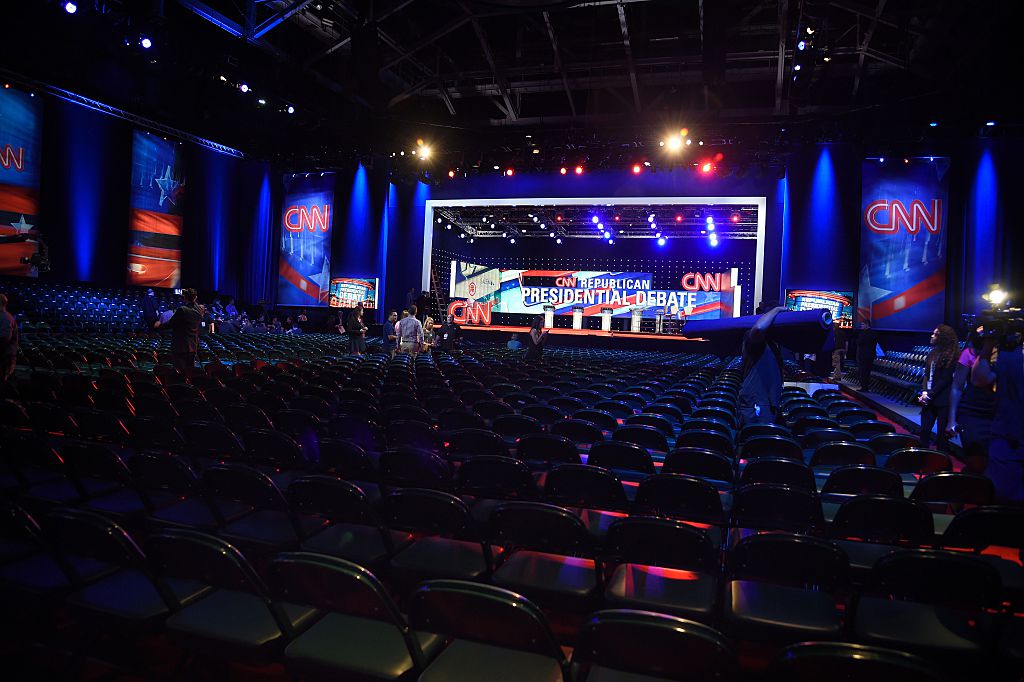There are officially too many 2020 Democrats for the debate stage


A free daily email with the biggest news stories of the day – and the best features from TheWeek.com
You are now subscribed
Your newsletter sign-up was successful
The Democratic National Committee is prepared to smush 20 candidates onto two stages for each of its 12 primary debates. One problem: Its 21st candidate just joined the race.
With Sen. Michael Bennet's (D-Co.) 2020 announcement on Thursday, the possibility now stands that too many Democrats will meet the DNC's requirements by the time the first debate rolls around in June. It also raises the question of whether the DNC's debate qualifications remain too attainable to push out improbable candidates — not that the committee has said it'll change them, The New York Times reports.
Of those already in the race, only 17 have qualified by either getting 65,000 donors, with at least 200 donors each coming from 20 individual states, or by polling at 1 percent in three polls on a predetermined list. Nine candidates — including seemingly long-shot contenders Rep. Tulsi Gabbard (D-Hawaii) and tech entrepreneur Andrew Yang — have hit both thresholds. Only four have yet to qualify, and they have nearly two months to do so. And let's not forget the few Democrats still teasing a run.
The Week
Escape your echo chamber. Get the facts behind the news, plus analysis from multiple perspectives.

Sign up for The Week's Free Newsletters
From our morning news briefing to a weekly Good News Newsletter, get the best of The Week delivered directly to your inbox.
From our morning news briefing to a weekly Good News Newsletter, get the best of The Week delivered directly to your inbox.
That poses a problem for the DNC's cap and qualifications, seeing as a committee spokesperson told the Times they wouldn't be changed now. Instead, the DNC has set up some tiebreakers. Debaters will be determined first if they meet both the donor and polling limits, then by their highest polling average, and then by most unique donors.
That's probably why Sen. Cory Booker (D-N.J.) started pushing Thursday to meet a second debate threshold, tweeting that he has around 63,000 individual donors and asking for "less than 2,000" more. Sen. Kirsten Gillibrand (D-N.Y.) and Julián Castro also specifically cited the individual donor threshold in tweets earlier this week.
Read more about the potential debate debacle at The New York Times.
A free daily email with the biggest news stories of the day – and the best features from TheWeek.com
Kathryn is a graduate of Syracuse University, with degrees in magazine journalism and information technology, along with hours to earn another degree after working at SU's independent paper The Daily Orange. She's currently recovering from a horse addiction while living in New York City, and likes to share her extremely dry sense of humor on Twitter.
-
 Health insurance: Premiums soar as ACA subsidies end
Health insurance: Premiums soar as ACA subsidies endFeature 1.4 million people have dropped coverage
-
 Anthropic: AI triggers the ‘SaaSpocalypse’
Anthropic: AI triggers the ‘SaaSpocalypse’Feature A grim reaper for software services?
-
 NIH director Bhattacharya tapped as acting CDC head
NIH director Bhattacharya tapped as acting CDC headSpeed Read Jay Bhattacharya, a critic of the CDC’s Covid-19 response, will now lead the Centers for Disease Control and Prevention
-
 NIH director Bhattacharya tapped as acting CDC head
NIH director Bhattacharya tapped as acting CDC headSpeed Read Jay Bhattacharya, a critic of the CDC’s Covid-19 response, will now lead the Centers for Disease Control and Prevention
-
 Witkoff and Kushner tackle Ukraine, Iran in Geneva
Witkoff and Kushner tackle Ukraine, Iran in GenevaSpeed Read Steve Witkoff and Jared Kushner held negotiations aimed at securing a nuclear deal with Iran and an end to Russia’s war in Ukraine
-
 Pentagon spokesperson forced out as DHS’s resigns
Pentagon spokesperson forced out as DHS’s resignsSpeed Read Senior military adviser Col. David Butler was fired by Pete Hegseth and Homeland Security spokesperson Tricia McLaughlin is resigning
-
 Judge orders Washington slavery exhibit restored
Judge orders Washington slavery exhibit restoredSpeed Read The Trump administration took down displays about slavery at the President’s House Site in Philadelphia
-
 Hyatt chair joins growing list of Epstein files losers
Hyatt chair joins growing list of Epstein files losersSpeed Read Thomas Pritzker stepped down as executive chair of the Hyatt Hotels Corporation over his ties with Jeffrey Epstein and Ghislaine Maxwell
-
 Judge blocks Hegseth from punishing Kelly over video
Judge blocks Hegseth from punishing Kelly over videoSpeed Read Defense Secretary Pete Hegseth pushed for the senator to be demoted over a video in which he reminds military officials they should refuse illegal orders
-
 Trump’s EPA kills legal basis for federal climate policy
Trump’s EPA kills legal basis for federal climate policySpeed Read The government’s authority to regulate several planet-warming pollutants has been repealed
-
 House votes to end Trump’s Canada tariffs
House votes to end Trump’s Canada tariffsSpeed Read Six Republicans joined with Democrats to repeal the president’s tariffs
